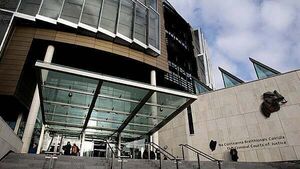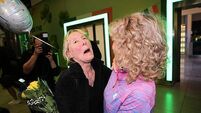'Knife buried to the hilt': prosecution rejects Kildare murder accused’s self-defence claim

Alison O'Riordan
A murder accused "buried" a knife "to the hilt" while fatally stabbing his aunt's partner and his account of giving "a few jabs to the stomach" in self defence does not accord with the pathology evidence, a prosecution barrister has told a jury.
Brendan Grehan SC, for the Director of Public Prosecutions, gave his closing speech in the trial on Tuesday, submitting that the deceased's remains were "the silent witness" in the case. Counsel said the injuries sustained from "almost top to toe" told a different story compared to the one "peddled" by the accused.
Ryan Kearney (39), with an address at Loughnamona Drive, Leixlip, Co Kildare has pleaded not guilty to murdering Jeffrey Jackson (50) at The Lamps, School Street, Kilcock, Co Kildare on February 8th, 2024.
Mr Jackson's partner, Breda Kearney, has given evidence that when she returned home after a brief trip to the shop she was met by her bloodied nephew Ryan Kearney, who told her he had stabbed her partner in the neck and thought he was dead.
In his garda interviews, Mr Kearney said that he took a knife off his aunt's enraged partner after a scuffle and gave him "a few jabs with it", telling detectives that he had no intention to kill and was in fear for his life.
In his closing speech today, Mr Grehan told the jury that the accused told the "first of many lies" when he informed emergency responders that "two fellas in black balaclavas" had attacked Mr Jackson.
The lawyer said Mr Kearney was also "quite prepared to pedal" a lie that he had tried to render first aid to Mr Jackson but abandoned this when he was challenged by gardaí, instead telling them that he was leaving the apartment when his aunt returned.
Mr Grehan said the man who now insisted he was the victim had given a huge amount of detail to the first garda at the scene. "Here he is minutes after, able to give a detailed description to potentially send gardaí on a wild goose chase; the first of a number of lies".
Counsel said Mr Jackson was a cancer survivor and most probably an alcoholic but neither of those things had killed him. "He was killed because of the actions of Mr Kearney".
The lawyer said the first time Mr Kearney had presented "what appeared at first blush to be the defence of self defence" was at 6.21pm on February 9th, when he told gardaí he had to stab Mr Jackson as "he kept coming back at" the accused.
Mr Grehan told the jury that the accused had said in garda interviews that Mr Jackson was "coming at him" in the kitchen and had to give him "a few jabs" into the stomach. The barrister submitted that this was not what had happened because of the objective evidence given by State Pathologist Dr Sally Anne Collis.
He added: "Mr Jackson's remains are the silent witness in this case in terms of the medical examination by Dr Collis. They tell a different story compared to the one peddled by the accused".
Mr Grehan said the expert witness had detailed 16 separate sharp force injuries on the deceased's body, of which 15 were stab wounds. He said there were injuries from "almost top to toe" on Mr Jackson and "not a couple of jabs into the stomach, that isn't what was found".
Counsel said Mr Kearney had a tiny cut to his baby finger. "That's effectively it, this man had been in a knife fight, it's quite extraordinary".
In contrast, Mr Grehan said, the longest stab wound which "tracked" into the deceased's chest measured 17cm in depth from a 12cm knife blade. Counsel said Dr Collis had explained this could arise from a body moving but the lawyer submitted "whatever way you look at it, the knife had gone a long way in".
Mr Grehan said the pathologist had also pointed out that because of his very high level of intoxication, Mr Jackson would have had limited awareness of the severity of his injuries and a limited ability to defend himself.
Counsel said the accused had identified a number of incidents he had with Mr Jackson in the past, where he said the deceased assaulted him with a pint glass and his fist.
Mr Kearney, he said, was quite adamant that the deceased was a violent man with mental health problems, who beat his partner Breda Kearney. "Breda Kearney said that wasn't so but it might explain why Mr Kearney might have some animus or hostility towards Mr Jackson".
Mr Grehan said Mr Kearney had stabbed Mr Jackson "all those number of times from head to toe" in circumstances where he could only have intended to cause serious injury if not death to the deceased.
He said Mr Kearney told gardaí he had the knife in his right hand and said Mr Jackson was in front of him. "How do you stab someone in front of you, facing you, in the place Mr Jackson had been stabbed, you might ponder that. I'm suggesting it simply does not appear to be possible".
Mr Grehan said "memory man" Mr Kearney, who was able to give "chapter and verse" of so many things that happened that day had got amnesia in his last interview with gardaí.
The barrister asked if Mr Kearney had an explanation to justify what had happened, why wasn't it the first thing out of his mouth, "telling everyone he came across instead of making up a story of men in balaclavas".
In summary, Mr Grehan said the accused had done this to cover up his "vile deed" and the violence he had unjustifiably inflicted on Mr Jackson.
"Why isn't he taking ownership of the knife on the sink? Because it's been washed. And why do you do this? Because you don't want to leave evidence if heading out the door and leaving," counsel said.
Mr Grehan said the "few stabs into the stomach" didn't accord with the pathologist's evidence and in particular the two fatal wounds to the chest. "That knife was buried and to use the last words of the pathologist - "to the hilt" - with these two injuries, to penetrate as far as it did, 16cm and 17cm into the body".
In those circumstances, Mr Grehan asked the jury to return what he said was the correct verdict of guilty of murder.
Defence counsel Michael Bowman SC began his closing speech by addressing the words "buried up to the hilt" as used by the prosecution. He described this as a "bold statement" that was divorced from the reality of the situation.
Mr Bowman argued that those words created an image of someone "driving in with tremendous force as far as the blade would go" but that Dr Collis' evidence was that other wounds to the deceased were superficial.
The trial continues tomorrow before Mr Justice Paul Burns and a jury of three men and nine women, when Mr Bowman will continue giving his closing speech.




